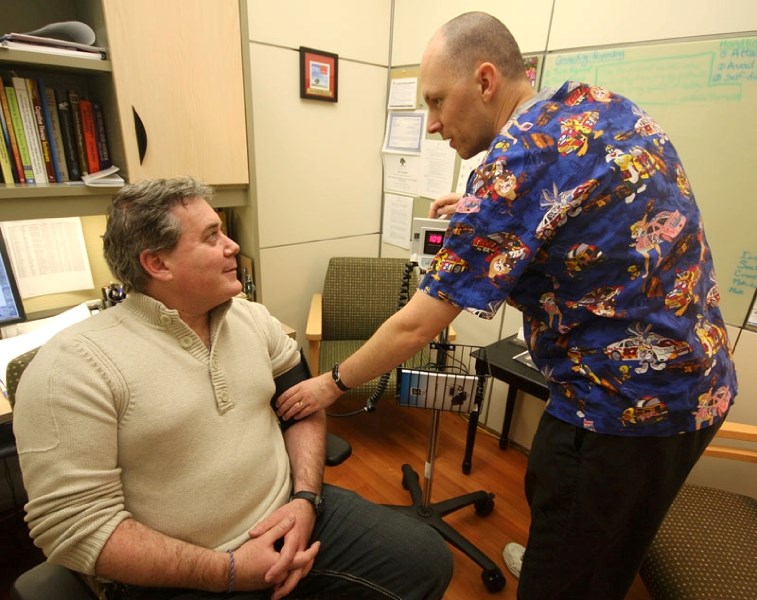In the five years since it formed, the St. Albert & Sturgeon PCN has grown to include 56 family physicians and a number of programs aimed at improving access to more comprehensive care for its 77,000 patients.
According to Dr. Wayne Daviduck, a family physician in St. Albert, primary care networks (PCN) make it easier for physicians to refer patients to specialists, especially in areas like chronic disease management.
"It's given a real outlet for family physicians in St. Albert to get people involved in the system and programs within the system that used to be really onerous to take part it," said Daviduck, who served as president of the PCN until last fall.
In addition to doctors, the network's multidisciplinary team includes mental health co-ordinators, nurses, dietitians and pharmacists.
PCNs were formed through a collaboration in 2003, between Alberta Health and Wellness, the Alberta Medical Association (AMA) and what were then the regional health authorities.
Called the Primary Care Initiative (PCI), the goal was to improve access to doctors and other frontline health care providers. The collaboration emphasized health promotion, disease and injury prevention and the care of patients with complex medical problems and chronic disease.
The first PCN was launched in 2005. Today there are 39 operating in Alberta. PCNs are funded on a per capita basis and patients may only access the network to which their family doctor belongs.
By the province's estimates, approximately 75 per cent of eligible family physicians in Alberta are currently working in a PCN.
This year, Alberta Health and Wellness said it would like to see 80 per cent of Albertans receiving care from PCN teams.
"What's unique about the PCNs is it is a local solution for a provincial problem," said Sheila Cousineau, business manager at the St. Albert and Sturgeon PCN.
Through the creation of PCNs, she said the province allowed health care teams to develop plans specific to their region.
"You can't take what we're doing in St. Albert and integrate that into downtown Edmonton where you have a lot of transient population, different population than we do here. Same as south side of Edmonton (where) they have a lot of multicultural families," she said.
While every PCN in the province is different, they all face the same issues, said Deb Wilson-Makinen, general manager at the St. Albert and Sturgeon PCN.
"They have the issues of aging population, they have the issues of managing chronic disease, the issue around obesity," she said.
"While their strategies may be different to engage patients on that, basically the issues, if you look at PCNs, they're all similar," she said.
Cyber counselling
One service unique to the St. Albert and Sturgeon PCN is cyber counselling.
The service, introduced nine months ago, allows patients to communicate with therapists through email and to maintain a permanent record of each session.
For some, the idea of communicating with a counsellor online is more appealing than traditional one-on-one interaction, said Lynn Thoma-Roche, a clinical social worker at the PCN.
"I think some people, particularly younger people, might prefer using a computer," she said.
"Also, not everybody can get to appointments easily, sometimes they don't have transportation, sometimes they live in rural areas, they might work out of town or women who are home with kids can't find a babysitter."
With email, Thoma-Roche said patients have more time to think about their responses.
And while traditional counselling allows therapists to pick up on non-verbal cues from patients, she said counsellors employ techniques to help determine how patients are feeling when email is the preferred mode of communication.
"We really try to interpret how somebody is doing, by asking them and also communicating how we're feeling to them," she said.
"It's still an alternative and I think that for a lot of therapists, face-to-face is probably the preferred way of meeting. But I feel comfortable using it as an adjunct."
New faces
Over the past year, the St. Albert and Sturgeon PCN has been successful in attracting six new doctors to St. Albert.
But PCNs across the province continue to be challenged by a shortage of family physicians in Alberta.
"And that's not going to change," said Wilson-Makinen.
"In order to provide primary care to the population as a whole, PCNS are seen as one strategy — not the only strategy — but one strategy to help with increasing access to primary care," she noted.
Wilson-Makinen said it's difficult to know how many patients in St. Albert and Edmonton don't have a family doctor. "We really don't have that answer."
She said the St. Albert and Sturgeon PCN attaches any mother with a baby, child with mental health issues, palliative care and chronic disease patients to a family doctor.
"We are moving toward increasing access by attaching some of those groups of patients," she said.
Looking ahead
Daviduck said there are many ways PCNs could expand services down the road, particularly in the areas of respiratory disease and weight management.
However, he said he is concerned that the funding model used today hasn't changed since the first PCNs were rolled out in 2005.
"The funding that was available then is exactly the same as the funding now, seven years later," he said.
"It really hasn't kept up with the times and what we're starting to see is PCNs now have their hands tied as far as further development for expansion because of limited budgets," he said.
Dr. Darryl LaBuick, current president of the PCN, agrees.
"Primary care has been identified as being a significant issue and will continue to be an issue into the future as our population ages," he said.
"With the fiscal challenges that we have within government and health expenditures, in order to take the next step to expand primary challenges in our communities, we need to see future funding to the PCNs."




